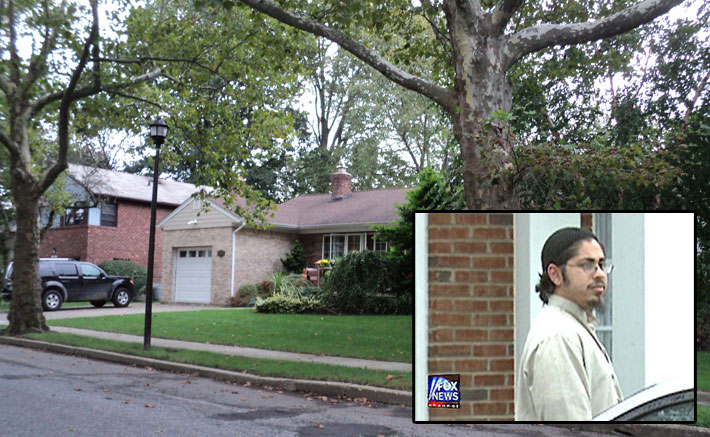

The Westbury home where al Qaeda propagandist Samir Khan once lived. (Photo credit: Long Island Press) Foreground: Samir Khan
Samir Khan, the al Qaeda propagandist killed in U.S. airstrikes alongside militant cleric Anwar al-Awlaki in Yemen last week, spent some of his teenage years living in Westbury, Long Island, just down the road from two prime targets: Roosevelt Field Mall and the Long Island Rail Road, officials and neighbors say.
Khan, 25, was the editor of Inspire, an English-language al Qaeda magazine that publishes interviews with leading terrorists as well as how-to articles on topics such as bomb building and firing assault rifles. Khan and al-Awlaki were seen as key players in sowing anti-Western sentiment that helped in recruiting new fighters. They became the first American citizens targeted and killed in a drone strike Sept. 30.
“He’s a person who was basically raised on Long Island, became radicalized and became a terrorist while he was on Long Island,” Rep. Peter King (R-Seaford), the chair of the House Homeland Security Committee, tells the Press. “It really makes you wonder.”
A law enforcement source confirmed that the Khan family moved from Queens to Nassau County, where they lived several years before moving to North Carolina eight years ago. It was unclear when he moved to the tidy L-shaped Plymouth Drive in Westbury, but the New York Times reported Khan began became radicalized after the Sept. 11, 2001 attacks—despite his family’s interventions.
“I am proud to be a traitor to America,” is the title of one article reportedly penned by Khan after he moved to Yemen in 2008 to head up Inspire magazine. East Meadow Patch reported Khan graduated in 2003 from W.T. Clarke High School, where he wrote for the student newspaper. Neighbors who remembered the family were stunned at the news, but the new owners of the Khan residence saw it coming.
“I wasn’t shocked when we heard about this,” says the new owner of the ranch-style home, Rocco Abbatiello. The 44-year-old independent contractor tells the Press he got the first of several visits from federal investigators asking about the house where Khan had lived with his parents and older sister six months after his family moved in to the home in the fall of 2003.
“Even when we purchased the house we never actually met them,” he says. “We gutted the whole house, it’s not like we found anything.”
Neighbors did not take the news as lightly.
“It takes away the whole sense of suburbia,” says one neighbor who asked not to be named. “They tell you if you see something, say something… Are we supposed to be suspicious of every new neighbor?”
The neighbor found it odd that the family suddenly moved to North Carolina on a week’s notice, but had never suspected anything out of the ordinary. The family reportedly wore traditional garb and mostly kept to themselves.
The Khan family released a statement Wednesday defending Samir and condemning his death, according to The Charlotte Observer.
“We feel appalled by the indifference shown to us by our government,” it reads. “No U.S. official has contacted us with any news about the recovery of our son’s remains, nor offered us any condolences.”
The statement charges Samir was deprived of his Fifth Amendment rights to due process.
“Was this style of execution the only solution?” it asks. “Why couldn’t there have been a capture and trial? Where is the justice?”
King has said the killing of al-Awlaki was justifiable despite his U.S. citizenship because he was at war. He tells the Press that al-Awlaki and Khan were more dangerous in recent years than the late al Qaeda chief, Osama bin Laden, “because they knew how to talk to Americans.”
“I read his magazine every month,” King says. “It’s scary stuff. I know the impact it has.”
Khan is not the first al Qaeda member from Long Island. Bryant Neal Vinas, Patchogue native and Muslim convert, pleaded guilty to conspiring to kill U.S. nationals in 2009. That was a year after he was captured in Pakistan, where he admitted giving al Qaeda information about the LIRR for a bomb plot.
In a related case, 45-year-old Mohammad Younis of Centereach pleaded guilty in August to operating an unlicensed money transmitting business after admitting in federal court that he unwittingly provided $7,000 to Faisal Shahzad, the would-be Times Square Bomber. Younis will be sentenced Nov. 30.
“No one was as effective as al-Awlaki and Samir Khan,” King says. “They knew American culture. They knew American hopes and fears.”




